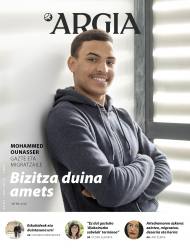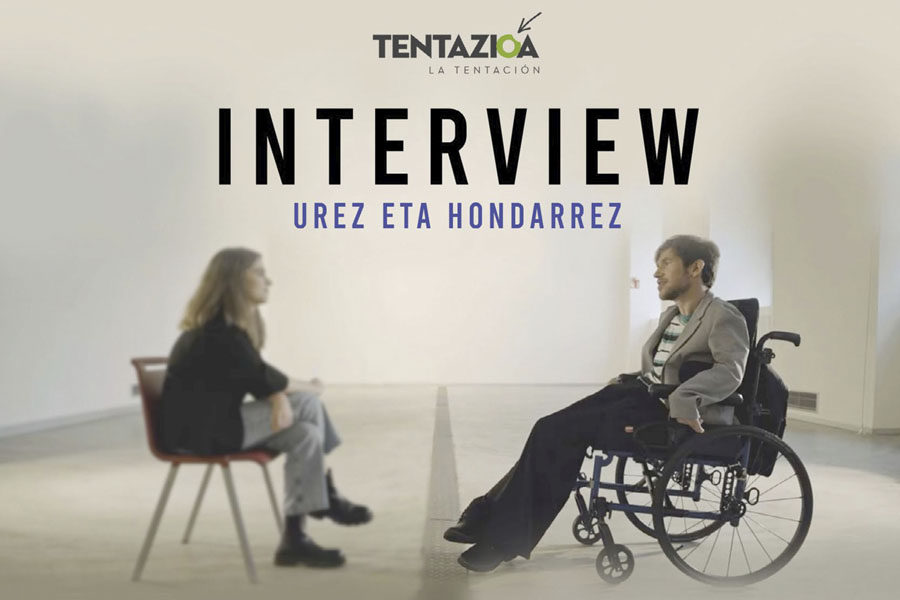A trip to words
- Colombian actress Aurora Mora, 40, has been in the Basque Country for four years, where she currently resides. On the eve of the premiere of a performance he receives the news: his mother has died. The questions will start then.

A trip starts the migratory path, but when does it land? Tierra Agria abroad.
Artedrama and Hutsteatroa once again raise their questions, with objectives and philosophies that go beyond mere theatre exposition. The documentary starts from the vision and experience of actress Laura Penagos, creating a fiction inspired by her own life. Migrations, exile, exile have always interested Ander Lipus, a member of the aforementioned companies and actor of this work together with Penagos: “At Etxekoak we were trying to look at the Basques abroad. Here, however, we will discuss the view that foreigners have towards us.”
However, the main theme is mourning, the death of the mother of the protagonist, who is immersed in the journey of migration, care, exile and people, indigenous and oppressed peoples, minority languages, colonization and racism, conflict and violence, and the emotional experiences and disorders of a lifetime.
Lipus and Penagos on stage, and Amancay Gaztañaga, for the first time with Artedram, in the role of director. Counting the latter, the capabilities of the eleven commuters have helped them round their edges: “I wanted to bring to the team my universe, the people I’ve met in my career, like Barbara,” said Gaztañaga. It refers to Barbara Rasso, who is responsible for the costumes of this work. Miren Amuriza has done the “hairstyle” of the text and added that with his vision he has helped clarify the members of the group. Ibon RG in sound, Arantza Flowers in lighting, Mikel Unamunzaga in technique, Iñaki Ziarrusta (Atx teatroa) in scenography, Iasone Parada e Irantzu Azpeitia in production and distribution, and Ainhoa Resano in photography.
The presentation was scheduled to be launched on 5 February in Luhuso, but now, because of the new measures that France has put in place, they will not be able to go ahead. The premiere, therefore, has been moved to Gipuzkoa, where the one that was originally going to be the second one has been projected. February 12, at the Santa Ana Theatre in Oñati.
Who to tell, who to listen
The work deals with the view of foreigners towards the Basques. To do so, they have had to collect the testimony of someone who experiences migration in the first person and give them their place on the stage. “Laura and Iñigo [Ander Lipus] met in a course and Laura taught her her her texts. Lipus immediately warned that he could not stop in a drawer, which was a story that had to be told. Laura’s world is wonderful,” says Gaztañaga. “I’m an actor, I’ve been in the Basque Country for twelve years, and I’ve had many experiences that have helped me grow and develop. Although in these years I have not had the opportunity to dedicate myself professionally to the theater, I have never crumbled,” says Penagos. He says that abroad Tierra Amarga has brought him peace and joy, as well as challenges: “I really like challenges, because they make me feel free and alive. This opportunity to be, to do and to share has given me great confidence.”
.jpg)
Penagos has used the characteristics of women, migrants and indigenous people to develop the details of the play. The director explained that it was clear from the beginning that the story had to be told by the women: “92% of fiction is produced by men. Even though women have been the protagonists, they have come out of men's heads. This story needs to be created by women. We have created them and they are our themes.” With this, we also wanted to analyze what the role of women is, how a creative woman who is not white lives in Euskal Herria, if she has any place in her. It's also a migrant. Nor is it common for someone who fulfills this profile to take the floor in artistic creation: “From this whiteness has allowed us to tell a story that we would not have the ability to tell.” Is it easy to integrate among the Basques for those who come from outside? What does a migrant woman work on? Who cares for the grandparents of our people? Is it worthy to be watching our relatives for twenty-four hours?
The main character of Aurora Mora is based on the life of the actress, who has died. Penagos, comes from the Colombian theatre school. In Euskal Herria, she has been looking for her place for eleven years, trying other schools and looking for work: “Undoubtedly, in the history we are telling there are traces and truths of my personality, of those lived in both Colombia and Euskal Herria,” the protagonist said. “It’s been a liberation, because I’ve freed up a part of the story that I’ve been carrying inside and outside of me for many years. Being able to count in the theater has been releasing the rolled water inside, it is necessary.” In the creative process, he has opened some doors and closed others, and the team has helped him gain confidence. “Moving away from Colombia has helped me understand what happens in my home country, its social processes and its essence. Paradoxically, when he lived in Colombia, he was unaware of what was going on there.”
Basque Country and Colombia
The Colombian born has made Euskera his own, because this is how it is spoken in all the work: “The Basque country has brought me closer to the Basque culture, to its vision of the world, to its history, to its struggles and challenges as a people,” says Penagos. “It has also been a complex and painful process, which has stood in the face of myself, our culture, our ancestors and our history and has influenced my way of seeing and thinking about the world itself.” The actress has been involved in “enriching” learning, as it has allowed her to understand Colombia more. Prior to the arrival of the colonizers in 1492, there were 90 million inhabitants in South America. Spanish and Portuguese eliminated almost 85 million indigenous people. Native peoples were enslaved, tortured and taken from the land and its culture. “What do the Basques have to learn from this? What is our responsibility?” they ask. “Colonialism made our language and culture disappear, and that was what led to the war that was experienced in our people. Where do we look to recover what has been stolen from us?” says Penagos. They have also wanted to bring to the theatres the extreme situation of Colombia, where over the last 54 years more than 220,000 people have lost their lives because of the armed conflict.
Like Euskal Herria, Colombia also has its struggles and challenges, and this has led Gaztañaga to rethink where we stand as Basques: “We have been a people that we have suffered a lot, but not the only one. The image we have of ourselves is that of a citizen who is in an unjust cause, but we are not aware of the privileges we have and where we are working. Much work remains to be done. We are oppressed as women and as Basques, but there are more oppressed.” Among the questions that the work opens, there is the possibility of migrants ceasing to be migrants. When can one take root in a particular place? What is your people? When will you get the Basque title? The Basques also know about the foreigner, as they also feel foreigners in this world. They talk about the communities that have fallen into the grip of globalisation and humanity, the cultures and identities that want to put an end to them and that have disappeared. The director acknowledges that the work has helped him to become aware of his privileges and that he has had “beautiful monologues” with himself: “From that external view, it is up to us to mirror and show what we are really doing with migrants.”
Time to step on the ground
.jpg)
It's time to release the work. In these times when emotions are so altered, they underscore the illusion, while still feeling respect and fear. Needless to say, the situation itself increases these last two feelings a little, and has hindered and doubled the work to be done: face masks, telematic meetings, difficulty in connecting and maintaining the actions, concern for the future, lack of contact, reduced capacity... And by the way, it's eliminated the essential features of the theater. “I often think, feel and say that our work is not compatible with COVID-19, that our work is contact work,” says Gaztañaga. In any case, some 40 actions have already been scheduled, which will continue, if there is nothing to be feared, until next November.
We've started these lines with a journey. A literal and metaphorical journey. And it's all happening in Aurora Mora's room. When you receive a call while you test the work you are going to do. In this space will mix the reality and the world of dreams and pass through Mora several characters, all interpreted by Lipus: Kepa, the Basque boyfriend of Aurora; his father Eusebio, sick of Alzheimer; the sister of Aurora Esperanza; his mother and his grandmother and ghosts Nayeli, descendants of the indigenous community. It will be they who, directly or indirectly, will tell the story. “Also in the scene we have tried to imagine that place of the aurora, how its interior feels outside. From the point of view of history, we have tried to create something very simple and profound: what family and place it is, if it is possible to break ties, what is expected of her age as an artist, how to look for a place in this system,” says Gaztañaga.
As mentioned at the beginning, they want to generate questions in the viewer: “Art is an opportunity to open questions and that’s what we want, whatever they are,” says Penagos. At the same time, it awaits unity and complicity, unity and understanding with the Basque public. Gaztañaga hopes to rethink “our egocentric view”, as if taking another opening is that the suffering of Euskal Herria itself can be cured by making room for some people. They claim that the viewer has fun.
Upcoming actions
February 19 - Andoain
February 20 - Markina-Xemein
February 21 - Errenteria
February 26-27-28 - Donostia .jpg)
March 2-3 - Bilbao
March 4 - Eibar
March 5 - Zumaia
March 6 - Gernika-Lumo
March 7 - Arrasate
March 12 - Bermeo
March 13 - Berriz
March 14 - Durango
March 19 - Zarautz
March 23 - Hernani
March 26 - Elorrio
March 28
April 10 - Aulesti April 16
- Zornotza April 23
- Sopela April 25
- Villabona
May 7 - Tolosa
May 16 - Pasaia
6 June - Hondarribia
15 June - Santurtzi
17 November - Vitoria-Gasteiz
I'm talking about Interview. With water and sand
Authors: Telmo Irureta and Mireia Gabilondo.
The actors: Telmo Irureta and Dorleta Urretabizkaia.
Directed by: Assisted by Mireia Gabilondo.
The company is: The temptation.
When: April 2nd.
In which: At the Victoria Eugenia... [+]
ERREALITATEAREN HARRIBITXIAK
Nork: Josu Iriarte, Nerea Lizarralde, Jare Torralba eta Amets Larralde. Mikel Martinezek zuzenduta eta Jokin Oregiren testuetatik abiatuta.
Noiz: otsailaren 21ean.
Non: Bilboko 7katu... [+]
Vagina Shadow(iko)
Group: The Mud Flowers.
The actors: Araitz Katarain, Janire Arrizabalaga and Izaro Bilbao.
Directed by: by Iraitz Lizarraga.
When: February 2nd.
In which: In the Usurbil Fire Room.














